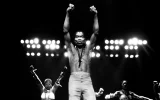Last week on Twitter random users began to tweet about a poster that had surfaced, announcing a Nigerian ‘Door Of Return’ campaign.
Nigeria ain’t trying to be left behind next December. I’m here for it all. pic.twitter.com/gGKTxzr3Uu
— G Money (@GMONEYizME) January 3, 2020
The campaign posters (which curiously used an image of the Lekkoyi bridge) claimed Nigeria was gearing up to start a campaign that would invite Africans in the diaspora to ‘return’ to the country to discover their heritage and resettle in the country if they felt so compelled. It sounded awfully similar to the Ghanaian Year of Return campaign that had just concluded with a #DettyDecember month long rave and saw many high profile celebrities visit the country as a way to rediscover their African heritage.
While the Ghanaian campaign had its criticisms, it had also been a resounding success, drawing tourists not just from the diaspora but also from across Africa, specifically thousands of Nigerians who wanted to travel out of the country but didn’t want to deal with the racism and scrutiny that often is a part of cross continental travel. Ghana wasn’t the only country who had executed a Year of Return Campaign in some capacity. Sierra Leone gave citizenship to popular actor Idris Elba and his family and made him commissioner for tourism as a way to attract diaspora interest in the country. Gabon also gave a number of high profile citizenships, and Liberia announced it was removing restrictions for diaspora citizens looking to relocate. Nigeria’s own campaign seemed a day late and a dollar short.
Only that it wasn’t even real.
DISCLAIMER!!!
BEWARE OF UNAUTHORIZED OF DOOR OF RETURN-* *NIGERIA 2020* *PROGRAMME.
The attention of Nigerians in Diaspora Commission (NIDCOM) has been drawn to a purported ”Door of Return 2020 program in Nigeria” by some agents.#Thread pic.twitter.com/2ZSmI1vzsu
— Nigerians in Diaspora Commission (@nidcom_gov) January 4, 2020
The Nigerians In Diaspora Commission (had no idea we had one) refuted claims that the Door Of Return policy was a new initiative, alerting concerned parties that indeed Nigeria already had a ‘Door Of Return’ programme that had been established in 2017 and featured specifically the Badagry slave trade route and had no affiliations with the claims made in the fake poster. This was the first many Nigerians have heard of the program and even now, details are vague as to how the existing program actually works. Ghana’s policy worked because the Ghanaian government invested heavily in cementing the branding around the campaign through traditional and new media channels, a tactic the Nigerian government only seems to whip out during election cycles.
Perhaps now, the government will take the branding of the existing door of return campaign more seriously now that they finally have proof of what is possible.











